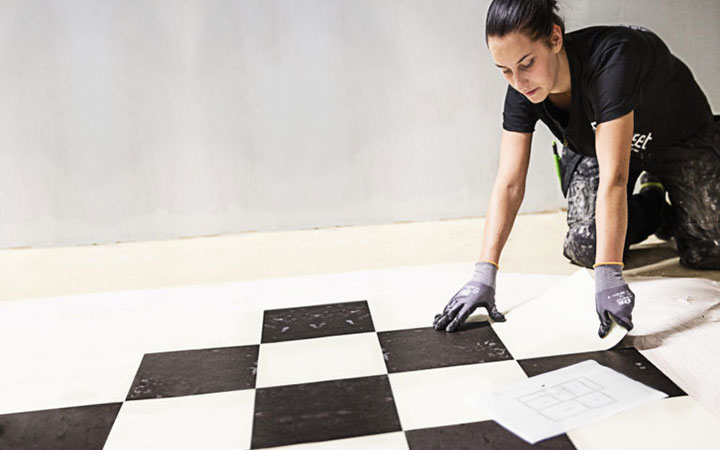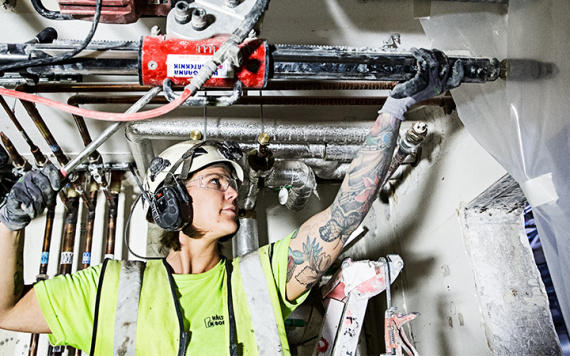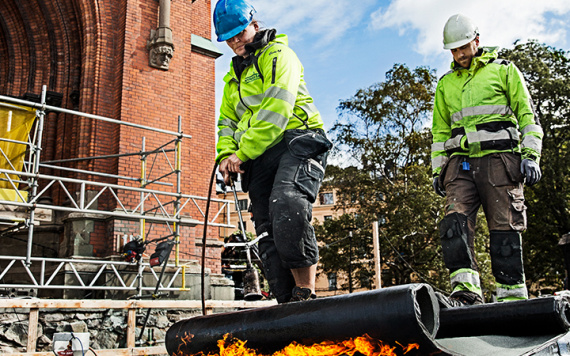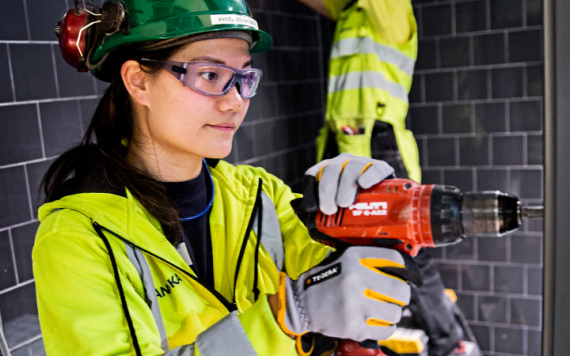Floor layer
Please walk all over my work
Do you have a sense of colour and design and enjoy precision work? Then being a floor layer could be something for you. It’s also a varied occupation that is always “on the inside” – it’s actually one of the few indoor jobs in the construction industry.
What does a Floor layer do?
As a floor layer, you are often a latecomer in the construction process, when nearly everything is finished. There are many different types of flooring: linoleum, cork, plastic, parquet and wall-to-wall carpeting. But the list can go on and on.
Flooring is a profession that offers broad variety. You often meet with new places and new conditions in your daily work. This can range from renovating apartments and commercial real estate to laying floors in new production. The flooring materials are often laid in large sections, but it is sometimes necessary to laying patterns such as parquet flooring, so a talent for precision and craftsmanship is important.

How can I become a Floor layer in secondary school?
You choose the building and construction programme and specialise in building construction. This provides your basic training.
The secondary school programme
In the first year, you study parts of the common secondary school subjects and the specific subjects that are common to the programme. The specific subjects of Building and Construction 1 and 2 provide you with knowledge and orientation in the different professions in the sector to better help you choose which one suits you best.
The programme combines theoretical and practical training in school with workplace-based learning (WBL). You must have at least 15 weeks of work-based learning during your training period. You can also complete your studies as a secondary school apprentice.
Qualification for higher education
As of August 2023 all programmes will be university preparatory programmes.
Qualification time
The period following initial training is called the qualification period. You work as an apprentice in a company during this time. The qualification period for a Floor layer is 36 months, after which you can apply for a professional certificate. You will receive an agreed-upon apprenticeship wage during the qualification period. You must independently apply for an apprenticeship position in a company with a collective agreement or a labour contract.
How can I become a Floor layer via adult education?
As an adult there are several ways to become a professional construction worker. You can choose to go either via the building and construction programme at VUX (secondary school for adults) or vacational advancement via the Employment Service. You can also choose to go thru an educational company. There are many opportunities as you can see!
The adult education programme
There are two paths: the School programme and the Adult education apprenticeship system.
The school programme is very similar to the secondary school programme. However, you only study vocational courses. The programme combines theoretical and practical education in school with training at the workplace, known as workplace-based learning (WBL). Roughly 15% of the total time is spent during workplace-based learning. The length of the programmes varies slightly but is usually one year. The length of the education period depends on the pace of the education, the choice of profession and the school’s own programme.
The majority of your training in the Adult education apprenticeship system (up to 70%) is at a workplace. Theoretical training is provided in the classroom. The length of the programmes varies slightly but is usually one year. The length of the education period depends on the pace of the education, the choice of profession and the school’s own programme.
Qualification time
The period following initial training is called the qualification period. You work as an apprentice in a company during this time. The qualification period for a Floor layer is 36 months, after which you can apply for a professional certificate. You will receive an agreed-upon apprenticeship wage during the qualification period. You must independently apply for an apprenticeship position in a company with a collective agreement or a labour contract.
How can I become a Floor layer as a company apprentice?
You must first find a company that wants to hire you as an apprentice.
Being a company apprentice means that you have a position as an apprentice but that you do lack some or all of an approved basic education and must now obtain this in the company. The programme has two parts, a theoretical and a practical part, which are studied in parallel.
The practical part is based on the qualifications for the respective profession and where you as an apprentice must achieve a certain degree of independence in each qualification. These must also be approved by your assigned supervisor.
You have 12 months to complete both the theoretical and practical parts of your basic training. Once this is completed and your supervisor has approved all parts, you can start your qualification period.
The education is conducted by Liber.
The distance learning programme
Liber’s education concept has been developed jointly with the industry. The education material consists of digital learning materials that, as a whole, support the entire learning process, from study and application to follow-up and individual adaptation. Construction methods, tasks, quality and environmental issues are described in context.
The course package is divided into two parts. First, a basic education programme that is the same for all professions (except for the machine professions), followed by an in-depth training programme for the chosen profession. When you register for an apprenticeship, the system recommends a training package based on the profession and the scanned certificates and diplomas.
The estimated time for complete theoretical training is roughly 100 hours.
Qualification time
The period following initial training is called the qualification period. You work as an apprentice in a company during this time. The qualification period for a Floor layer is 36 months, after which you can apply for a professional certificate. You will receive an agreed-upon apprenticeship wage during the qualification period. You must independently apply for an apprenticeship position in a company with a collective agreement or a labour contract.


